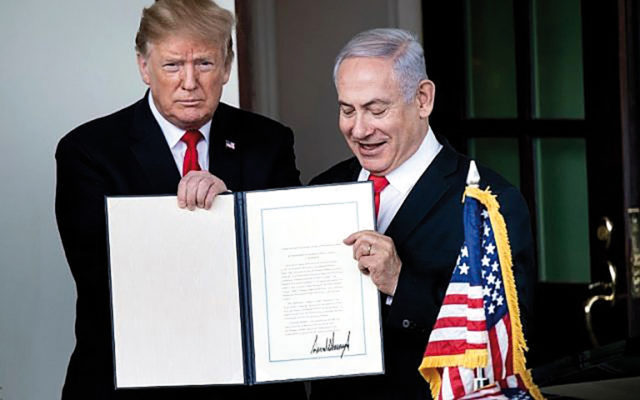Rosh HaShanah was surely an exceptionally emotional one for most Jews this year. We reflected upon the most difficult year for Jews worldwide, beginning with October 7 and continuing now. With the abandoning of Jews by our supposed “friends,” especially in the West, we increasingly realize Bilaam’s assessment (BaMidbar 23:9): “Behold it is a nation that will dwell in solitude and not be reckoned among the nations.”
The davening here in Baltimore was led by beautiful baalei t’filah and wonderful singing. Naturally, there were times that I was nostalgic for the traditional Young Israel nusach and their baalei t’filah. Yet, for some reason I did not find myself emotional to the point of tears.
But that changed. And for reasons totally unrelated to the davening itself. On the first day, in the middle of the repetition of Musaf, I turned around to see three very Israeli looking teens hovering near the middle shulchan (altar), where the shofar is blown. They all were dark-skinned with the latest style of haircuts in Israel. One was wearing a tight pullover with jeans, one had a small nose ring in his left nostril, and one wore a sleeveless T-shirt exposing small tattoos running up and down his arms onto the back of his neck. Of course, they all donned yarmulkas. The sight was quite jarring.
I watched as they all paid close attention to the shofar and sang along with some of the davening. The sight of the tattoos immediately conjured up images in my mind of kids looking like that being shot at and dragged from the Nova concert. It also clearly reminded me of the images of so many young soldiers we visited in Tel HaShomer Hospital with the same type of tattoos engraved onto their shattered bodies.
Following the shofar blowing, I went over to the one with the nose ring. I couldn’t help but pat his back and I asked him what he was doing in Baltimore. He said one of his friends knows someone in Baltimore, which is what brought them to town. “But why are you now in the States?” I asked. “Because I’m on chofesh (vacation) from the army,” he explained.
He told me he was wounded while fighting in Gaza, and the army will not let him fight again. They will give him no more than a desk job, which does not interest him. His wish is to go back to fight. So, he decided to take off instead.
I watched this kid and the others with him and was overwhelmed. These are Jewish kids who are far away from Yiddishkeit as we know it. Yet, look at their burning desire to fight for Jews. Look at their yearning to hear shofar, even if coming to a totally strange place to hear it. I told the soldier I was talking to that I have 23 nephews serving in the army and Hashem should protect them all. I excused myself and walked away with tears welling in my eyes, and my throat too choked to continue talking.
When I met my wife outside of shul after davening, I was still too emotional to talk about it. After I regained my composure, I told her that now I understand the Chazal (Talmudic Sages) who tell us that Jews are compared to a pomegranate. “Just as even the emptiest pomegranate is filled with seeds, so too are the most disconnected Jews filled with mitzvos” (Sanhedrin 37a). These kids with tattoos and nose rings are Jews who are filled with mitzvos, whether they realize it or not.
There has been much unfair criticism about the IDF coming from certain quarters in recent times, both here and in Israel. For years, the yeshivah world has claimed exemption from the army by arguing “Torah protects,” even more than the army. No doubt there is truth to that. Last week, when Iran attacked Israel with a barrage of hundreds of guided missiles, not one Jew was killed or seriously hurt. A Gazan in Jericho died as shrapnel fell on him. And a few Iranians were killed in Iran due to a rocket misfire.
It was a classic illustration of “Hashem will make war for you, and you will be silent” (Sh’mos 14:14).
However, we have heard public chants that the purpose of the army is “shmad,” to uproot Judaism. We have also heard that the entire purpose of Eretz Yisrael is to learn Torah and not to serve in an army.
First, why resort to accusations of shmad? So many chayalim died with their gemaras in their hands. Literally. There are countless accounts of divisions in the army infused with soldiers who are holy fearers of Hashem. And why abandon the original reason of Torah protects?
If there is not supposed to be an army in Eretz Yisrael, what do we say to Yehoshua, David HaMelech, and all the Jewish kings of Israel who had armies? (Besides, of course, Moshe Rabbeinu.)
Most significantly, think of what these awful accusations do to the grieving mothers, widows, and orphans. What are they to think of their loved ones who gave their lives fighting for am Yisrael? Causing them pain is among the worst things a Jew can do (see Sh’mos 22:21).
We have suffered enough. We ask Hashem to count the mitzvos of each and every Jew. Any one of us will outdo any pomegranate. We deserve a much better year ahead, b’ezras Hashem.
Rabbi Yoel Schonfeld is the Rabbi Emeritus of the Young Israel of Kew Gardens Hills, President of the Coalition for Jewish Values, former President of the Vaad Harabonim of Queens, and the Rabbinic Consultant for the Queens Jewish Link.















